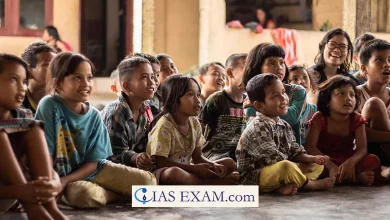Equity Concerns in IPCC Climate Reports
Syllabus: Environment [GS Paper-3]

Context
The IPCC recently published its 6th Synthesis Report, which includes updates and compilations from its sixth assessment cycle.
Key Points
- In the latest IPCC report, the last component of the AR6 report the IPCC reinforces that immediate action on climate is essential to secure a livable future.
- It concentrates on the rising risks with every uk supplier 1/10 degree ,such as more severe heat waves, heavier rainfalls and other forms of extreme weather patterns.
- They give these risks an opportunity to appear and impact the health of humans and ecosystems. According to the report, there is increasing evidence of the damage being done disproportionately to those parts of the world that are the lowest in terms of their contribution to climate change; in fact, almost half of the populations live in the areas that are the most vulnerable.
- This phenomenon has had 15 times greater mortality rates from floods, droughts and storms in the past 10 years in the tropical regions of the Earth.
- The report also weighs very much on the quickening of effort for adaptation challenges that arise due to climate change. It points to the need of warming being kept to 1.5°C above the pre-industrial level, and to achieve this, the whole world shall have to reduce the emission of greenhouse gases quickly, strongly, and sustainably in all areas.
IPCC
- The IPCC (Intergovernmental Panel on Climate Change), a UN body which assesses scientific work on climate change and its repercussions, is one of major sources of information on this phenomenon.
- It came into force as per the recommendation of the World Meteorological Organization (WMO) and the United Nations Environment Programme (UNEP) in 1988.
- The IPCC is the group that delivers assessing reports which are developed based on the state of climate change knowledge at the time and outline its impacts as well as solutions.
- As they give these detailed reports, they also direct their efforts in concerned issues which includes global warming, climate change and land and ocean cryosphere.
- India takes the IPCC membership; 195 states form this organisation. IPCC reporting is conducted by the secretariat located in Geneva, Switzerland and hosted by WMO (World Meteorological Organization)
Key highlights of recent IPCC Reports
- Rising Climate Risks: Climate hazards like heat waves, rainfall extremes, and their impact on the environment and human health.
- Disproportionate Impact on Vulnerable Populations: Discussion on how climate change disproportionately affects less-contributing, more vulnerable regions and populations.
- Urgency of Climate Action: The need for immediate and substantial actions to mitigate and adapt to climate change to avoid further catastrophic impacts.
- Focus on Climate Justice: Emphasising the concept of climate justice, highlighting the inequities in climate impact and the need for equitable solutions.
- Adaptation and Mitigation Strategies: Overview of recommended actions and strategies to adapt to and mitigate the effects of climate change.
- Financial and Economic Considerations: Analysis of the financial requirements and economic implications of climate actions, particularly for developing nations.
- The Role of Governments and Policies: The importance of political will, international cooperation, and effective policies in combating climate change.
- Challenges in Implementation: Addressing the barriers and challenges faced in the implementation of climate action plans and strategies.
IPCC reports emphasise equity issues
- Equity-Centred Modelling involves modifying Integrated Assessment Models to prioritise fairness in sharing the burden of climate mitigation between developed and developing countries.
- Climate Finance aims to increase funding for adaptation and mitigation projects in developing countries, ensuring equitable allocation and reaching vulnerable communities.
- Technology Transfer facilitates the affordable transfer of clean technologies to enable low-carbon development in developing countries.
- Policy Coordination strengthens international cooperation and alignment with equity principles in climate policies.
- Empowerment of Marginalised Communities prioritises the inclusion and participation of marginalised groups in climate decision-making.
- Public Awareness and Education aims to promote a sense of shared responsibility and solidarity in climate action.
Conclusion
Equity concerns in IPCC reports highlight the disproportionate impact of climate change on vulnerable populations. These findings stress the need for globally coordinated, equitable climate action, emphasising both mitigation and adaptation. The focus is on integrating climate justice in policies, enhancing international cooperation, and valuing local insights.
Source: The Hindu
UPSC Mains Practice Question
Analyse the implications of the latest Intergovernmental Panel on Climate Change (IPCC) report for global climate policy. Discuss how the report’s findings should influence future international negotiations and domestic policy frameworks, especially in the context of developing countries and the principle of equity in climate action.





.png)



